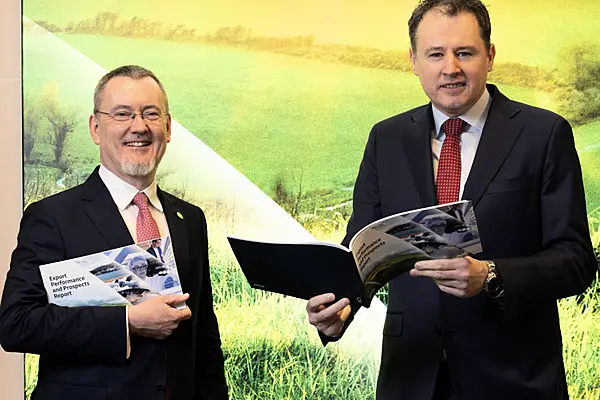Hospitality Ireland presents a round-up of the latest airline and aviation news from around the world.
Wizz Air In Talks Over Large Airbus Jet Order
Hungary's Wizz Air is in negotiations with European plane maker Airbus over the purchase of at least 100 more narrowbody jets, industry sources said on Thursday September 9.
Talks began several months ago and surfaced as Wizz Air emerged as a suitor for rival easyJet and as Europe's largest budget carrier, Ryanair, remained deadlocked with Boeing over a major jet purchase.
Analysts say all three major European budget airlines are forecast to expand as the COVID-19 crisis further erodes the finances of national legacy carriers.
Talks between Wizz Air and Airbus continued over the summer but the two sides are not yet ready to announce a deal, the sources said. Fleet purchase talks typically take months.
Any deal would involve at least 100 aircraft, one of the sources said.
Wizz Air, which has already ordered a total of 388 Airbus jets, declined to comment.
A spokesperson for Airbus said it always talks to customers about their needs but never comments on such discussions.
EasyJet Rejects Wizz Bid And Raises $1.7bn To Go It Alone
EasyJet has rejected a takeover approach from Wizz Air that would have created a low-cost airline to rival Ryanair, opting instead to raise $1.7 billion from shareholders and go it alone in an industry battling to recover from the COVID-19 pandemic.
EasyJet declined to name its suitor, but a source familiar with the matter told Reuters it was Wizz Air. Wizz also declined to comment.
EasyJet said the all-share approach fundamentally undervalued its business, and added the potential bidder had since said it was no longer interested in a deal.
The approach was "highly conditional in its nature which made it very uncertain in terms of the deliverability," easyJet CEO Johan Lundgren told reporters, without giving details.
EasyJet said the fundraising, its second of the pandemic, would strengthen its balance sheet should the COVID-19 downturn continue and allow it to operate more aggressively once the recovery arrives. It has identified landing slots across Europe it could acquire, including in Paris, Amsterdam and Milan.
"I believe this is really a once in a lifetime opportunity," Lundgren said.
EasyJet, which during the pandemic sunk to its first ever annual loss and cut 4,500 jobs, wants to steal market share from legacy carriers like British Airways owner IAG and Air France-KLM as they retract their short-haul operations.
But it faces stiff competition from Ryanair, Europe's largest budget airline, and rapidly expanding Wizz, both of which have recovered faster than easyJet this year.
Wizz is strong in eastern European destinations like Poland and Romania, while easyJet is well-positioned in countries including Britain, Italy, Switzerland, Germany and France. Adding to their potential good fit, both also operate all-Airbus fleets.
"EasyJet has always been a strategic target for Jozsef Varadi," said a senior industry source of the Wizz CEO.
Based on passenger data from last year, when fewer people travelled during the pandemic, a combination of the pair would still lag Ryanair by almost 20 million passengers.
Wizz, which counts aviation veteran Bill Franke as its chairman and his Indigo Partners as its biggest shareholder, has a market value of £5.1 billion ($7 billion), while easyJet is worth 3.3 billion pounds. Its share price has also outperformed easyJet's.
Shares in Wizz had bounced back to pre-pandemic levels by November 2020 and hit an all-time high of 5,595 pence in March. EasyJet's stock, by contrast, had recovered 70% of its pre-pandemic value by May 2021 before starting another decline.
Illustrating the ongoing travel slump, easyJet said that over July-September it expected its capacity to be about 57% of pre-pandemic levels. Ryanair flew around 75% of its normal passenger numbers in August, and Wizz flew over 85% that month.
For the last three months of 2021 easyJet expects to fly up to 60% of 2019 levels, held back by Britain's slower return to international travel than the rest of Europe.
The drawn out recovery has already forced easyJet to raise £5.5 billion from shareholders and debt markets, and by selling and leasing back aircraft. It also announced a new $400 million debt facility on Thursday.
In June 2020, easyJet raised 419 million pounds from investors, but its biggest shareholder, founder Stelios Haji-Ioannou, did not participate. The new rights issue, raising 1.2 billion pounds, represents a 35.8% discount on the theoretical ex-rights price of 638 pence per share on Sept. 8.
Shares in easyJet, which were trading around 1,550 pence before the pandemic hit in early 2020, were down 10% at 710 pence at 1105 GMT on September 8, while Wizz was down 2%.
James Halstead, managing partner at consulting firm Aviation Strategy, said the takeover announcement would normally mean easyJet was in play, but there were few alternative buyers due to high industry debt levels and competition issues.
The rights issue is underwritten by BNP Paribas, Credit Suisse, Goldman Sachs, Santander and Societe Generale.
Greek Carrier Aegean's Passenger Traffic Jumps 70% In July-August
Greece's largest carrier, Aegean Airlines, said on Thursday September 9 that its passenger numbers rose 70% in July and August compared to the same period in 2020 as tourism rebounded after last year's slump.
Aegean, a member of the Star Alliance airline group, said the rise in passengers improved its load factor to 71.7% but it remained lower than the 82.7% level it reached in 2019, a record year for tourism in Greece, before the outbreak of the pandemic.
The airline said it flew more than 2.3 million passengers in the July-August period, meaning the number topped the entire passenger traffic of the previous six months.
Passenger traffic on flights abroad jumped 108% compared to the same months last year, reaching 1.2 million passengers.
US Airlines Flag Hits To Bookings From Surge In Delta Variant Of COVID-19
Several US airlines have warned of a slowdown in ticket sales and cut revenue forecast as the fast-spreading Delta variant of the coronavirus threatens to blunt the recovery in travel that had started following the roll out of vaccines.
American Airlines expects third-quarter total revenue to be down about 24% to 28% compared with the same period in 2019. The company had previously estimated revenue to decline 20%.
The world's largest airline blamed the Delta variant for softness in bookings in August and said that "this weakness has continued into September and has resulted in a slowing of net bookings growth for close-in travel."
Airlines were banking on a strong rebound in demand for air travel after being hammered by a collapse in business travel and the grounding of international flights. But the Delta variant has put a spanner in the works.
Earlier this month, the Transportation Security Administration said it screened 1.345 million airline passengers on Aug. 31, the lowest daily number since May 11.
United Airlines Holdings Inc expects revenue to fall 33% in the third quarter from 2019 and capacity to decline at least 28%, more than the 26% fall forecast earlier.
Delta Air sees third-quarter adjusted revenue to be at the lower end of its forecast, while JetBlue Airways Corp expects current-quarter revenue to decline between 6% and 9% compared with its previous estimate of 4% to 9% decline.
Southwest Airlines Co said the company might incur a loss in the current quarter, warning that softness in leisure bookings has continued into September and October.
Airlines, however, remained cautiously optimistic about demand picking up in the holiday season. JetBlue anticipates leisure demand for peak holiday travel "will hold up relatively well."
Delta Airlines said that booking trends have stabilised in the last 10 days and expects recovery to resume.
White House Targets 20% Lower Aviation Emissions By 2030
The White House on Thursday September 9 that said it is targeting 20% lower aviation emissions by 2030, as airlines facing pressure from environmental groups to lower their carbon footprint pledged to use more sustainable aviation fuel (SAF).
The push to accelerate carbon cutting is part of President Joe Biden's target of making the United States net carbon neutral by 2050.
It comes as the United States and Europe are trying to boost production of SAF, which is now made in miniscule quantities from feedstocks such as used cooking oil, and can be two to five times more expensive than standard jet fuel.
Biden said he is seeking a SAF tax credit as part of the $3.5 trillion reconciliation bill being pushed by congressional Democrats, a move the industry says is necessary to offset the higher costs of production.
Announcements from the White House and U.S. carriers confirmed Reuters reports that Biden officials were eying a target date of 2050 for weaning aircraft off fossil fuels, along with airline support for a voluntary target of 3 billion gallons of SAF in 2030.
Three federal departments are launching a government challenge to supply at least 3 billion gallons of SAF per year by 2030 and ample SAF by 2050 "to meet 100% of aviation fuel demand, currently projected to be around 35 billion gallons a year," a White House fact sheet said.
Global aviation has faced calls by environmental groups for curbs to air travel amid growing pressure on airlines to cut emissions.
Biden's administration is taking a different approach than Europe, where regulators are seeking to force suppliers to blend rising amounts of SAF into their kerosene.
"It is essentially an aspirational goal," said Dan Rutherford, aviation director at the International Council on Clean Transportation, an environmental research group based in Washington.
United Airlines also announced on Thursday a record purchase agreement for 1.5 billion gallons of SAF over 20 years from Alder Fuels, under certain conditions, starting in 2025.
Alder Fuels chief executive Bryan Sherbacow said the size of the deal with United is doable because the fuels will be produced from forest and crop waste, which are less expensive than fats, used oils and grease which are in short supply.
"The big thing is expanding supply in addition to fat, oil and grease," said Sherbacow, who left his position a few weeks ago as chief commercial officer of world energy to launch Alder.
"That enables scalability, that enables more cost competitiveness," added Sherbacow, who remains a senior advisor to World Energy, the largest US SAF producer.
Both United and Honeywell made equity investments in Alder, he said.
LATAM Airlines Receives Several Financing Offers To Exit Bankruptcy
LATAM Airlines said on Thursday September 9 that it has received several offers to fund its exit from Chapter 11 bankruptcy, each of which are worth more than $5 billion.
LATAM, the largest airline in Latin America, received the offers from creditors and shareholders, according to a filing with the U.S. Bankruptcy Court in New York City.
The Santiago, Chile-based company did not reveal the number of offers received or from whom they came, but Delta Air Lines Inc is LATAM's largest shareholder. Other shareholders include Qatar Airways, with a 10% stake.
LATAM, which also operates in Brazil, Colombia, Ecuador and Peru as well as having operations through Latin America, Europe, the United States and the Caribbean, only said in the filing the offers came from "its most significant claimholders and its majority shareholders." It said negotiations for financing are ongoing.
LATAM filed for Chapter 11 bankruptcy protection in New York in May 2020 as world travel came to a halt amid the COVID-19 pandemic.
It hopes to accomplish by the end of the year the major tasks it needs to exit bankruptcy but may not formally exit by that time, according to a person familiar with the company's thinking who asked not to be identified.
The financing proposals the airline has received each include a combination of new debt and equity, which would be backstopped by the creditors or shareholders making the offer, the company said. Each offer would likely result in the substantial dilution of existing shares, it said.
However, the source said LATAM has no intention of pursuing a sale of any of its business units.
The company also forecast in Chilean regulatory filings a return to pre-pandemic profitability and capacity by 2024, as well as a projected 13% increase in total revenue by 2026.
LATAM estimates the total claims filed in the bankruptcy will fall between $8 billion and $9.9 billion, according to the regulatory filing.
The company's exclusive period to file a proposed reorganization plan expires on Sept. 15, but it filed a motion seeking an extension through Oct. 15. It will have the option to extend that deadline again by about a month if necessary.
LATAM has said it wants to grow its Boeing 787 Dreamliner fleet as part of its five-year business plan and expects to have a fleet of 28 by the end of 2021.
The airline’s overall fleet will decrease to 286 by the end of the year from around 340 before the pandemic. However, it expects to increase that amount back up to 331 by 2026.
In August, the company secured court approval to enter into lease agreements with Avolon Aerospace Leasing Limited and ORIX Aviation Systems for five Dreamliners made by Boeing Co.
The company had $1.9 billion in liquidity as of July 31. It also has the option to tap additional financing approved earlier in the bankruptcy proceeding, including up to $750 million in secondary financing.
Japan Airlines Finalises $2.7bn Raising To Position For Post-COVID-19 Era
Japan Airlines Co Ltd (JAL) said on Friday September 10 that it had finalised plans to issue 300 billion yen ($2.73 billion) of hybrid loans and subordinated bonds to give it a safety net and position it for a post-coronavirus business environment.
It will raise 200 billion yen from hybrid loans and 100 billion from subordinated bonds, the airline said in a statement to the stock exchange.
JAL had announced initial plans for the raising on Thursday September 9 but provided more details of the funding mix and uses on Friday.
"We would like to maintain our commitment line unused, as we believe it is the last-resort safety net," JAL's general manager of finance, Yuichiro Kito, told reporters. "We don't want to be lamenting the unexpected."
The airline last month forecast its cash burn rate to fall to around 5 billion yen a month in the second quarter ending Sept. 30 from 10 billion to 15 billion yen a month in the first quarter.
However, Kito said the severe COVID-19 situation in Japan meant the company was not certain it could meet the second-quarter cash burn target.
The airline said the proceeds from the raising would be used to introduce Airbus SE A350-1000s as its new flagship aircraft, helping it to reduce carbon emissions on international flights.
JAL will also renew its revenue management system for domestic routes and repay other debt with the raising's proceeds, it added.
"This isn't just about defense, this financing is also positioning ourselves to be aggressive in the post-coronavirus future," Kito said.
News by Reuters, edited by Hospitality Ireland. Click subscribe to sign up for the Hospitality Ireland print edition.









